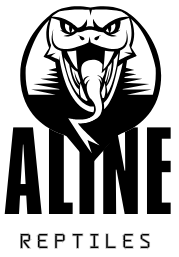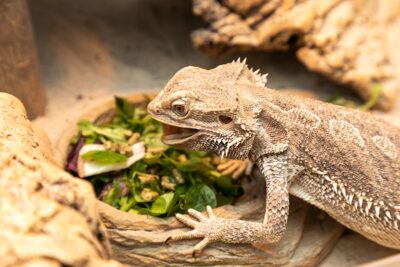When it comes to feeding your bearded dragon, you want to provide a diet that keeps them healthy and thriving. One of the most common questions reptile owners ask is: Is kale good for bearded dragons? Some sources say kale is an excellent source of nutrients, while others warn against its oxalate and goitrogen content.
Kale is safe for bearded dragons in moderation, but it should not be a daily staple. In this article, we’ll dive deep into the benefits and risks of feeding kale, how often you should serve it, and the best alternatives to ensure your bearded dragon gets a balanced diet. Keep reading to make the best decision for your scaly friend.
Nutritional Breakdown of Kale
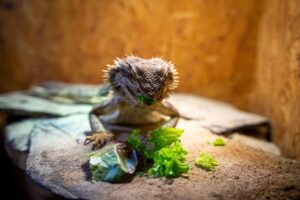
Kale is often praised for its high nutritional value, but how does it stack up for bearded dragons? Below is a table showing the nutrient content per 100g of raw kale:
| Nutrient | Amount | Importance for Bearded Dragons |
|---|---|---|
| Water | 89.63 g | Keeps your dragon hydrated |
| Protein | 2.92 g | Supports muscle development |
| Fiber | 3.6 g | Aids digestion |
| Calcium | 254 mg | Essential for bone health |
| Phosphorus | 55 mg | Works with calcium, but too much can be harmful |
| Vitamin A | 5000 IU | Supports vision and immune health |
| Vitamin C | 120 mg | Boosts immune function |
| Vitamin K | 705 mcg | Helps with blood clotting and bone strength |
From this table, we can see that kale is rich in calcium, fiber, and vitamins—all of which are beneficial for bearded dragons. However, it also contains compounds that require caution.
Benefits of Feeding Kale to Bearded Dragons
Despite concerns, kale offers several benefits when included in a bearded dragon’s diet in moderation:
1. Rich in Calcium
Calcium is one of the most important nutrients for bearded dragons, as it helps prevent metabolic bone disease (MBD). With 254 mg of calcium per 100g, kale is a great source of this essential mineral.
2. High in Vitamins A, C, and K
- Vitamin A supports eye health and immune function.
- Vitamin C strengthens the immune system.
- Vitamin K aids in blood clotting and bone strength.
3. Provides Hydration and Fiber
With nearly 90% water content, kale helps keep your bearded dragon hydrated. The fiber content also promotes good digestion and prevents constipation.
Potential Risks of Feeding Kale
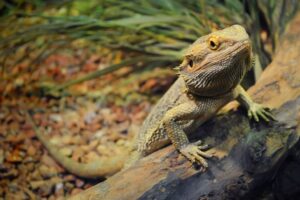
While kale is nutritious, it does contain certain compounds that could be problematic if overfed.
1. Oxalates Can Interfere with Calcium Absorption
Oxalates bind to calcium, making it harder for your bearded dragon’s body to absorb the mineral properly. Over time, this can lead to metabolic bone disease (MBD). However, kale has relatively low oxalate levels compared to other greens like spinach.
| Green | Oxalate Content (per 100g) |
| Spinach | 970 mg |
| Swiss Chard | 645 mg |
| Kale | 20 mg |
| Collard Greens | 35 mg |
| Mustard Greens | 40 mg |
2. Goitrogens May Affect Thyroid Function
Goitrogens are compounds found in cruciferous vegetables (like kale, cabbage, and broccoli) that can interfere with thyroid function by affecting iodine absorption. If fed in excess, kale could contribute to thyroid issues.
How Often Can Bearded Dragons Eat Kale?
Given the nutritional benefits and potential risks, kale should be fed in moderation, typically 1–2 times per week. This ensures your bearded dragon enjoys the health benefits of kale without overexposure to oxalates and goitrogens.
Best Way to Serve Kale
- Wash thoroughly to remove any pesticides.
- Chop finely to make it easier for your dragon to eat.
- Mix with other greens to create a balanced diet.
Best Alternatives to Kale for Bearded Dragons
If you’re looking for safer, nutrient-rich alternatives to kale, consider the following greens:
| Green | Calcium (mg per 100g) | Oxalates (mg per 100g) | Best Feeding Frequency |
| Collard Greens | 232 | 35 | Daily |
| Mustard Greens | 118 | 40 | Daily |
| Dandelion Greens | 187 | Low | Daily |
| Turnip Greens | 190 | Moderate | 3-4 times per week |
| Endive/Escarole | 52 | Very Low | Daily |
Frequently Asked Questions (FAQs)
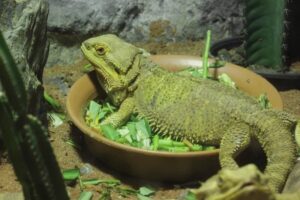
1. Can Baby Bearded Dragons Eat Kale?
Yes, but in smaller amounts than adults. Baby dragons need more calcium, so focus on higher-calcium greens like collard and dandelion greens.
2. Should I Cook Kale Before Feeding It?
No. Raw kale is best since cooking can break down some of the nutrients. Just make sure to wash it well.
3. Can Bearded Dragons Eat Kale Stems?
It’s best to remove the stems, as they can be too tough and difficult to digest.
4. What If My Bearded Dragon Refuses Kale?
Not all bearded dragons like kale. Try mixing it with other greens or offering different vegetables.
Conclusion
Yes, kale can be a healthy part of your bearded dragon’s diet when fed in moderation. It provides valuable nutrients like calcium and vitamins, but its oxalate and goitrogen content means it should not be a daily staple.
To ensure a balanced diet, mix kale with safer greens like collard, mustard, and dandelion greens. By rotating different leafy greens, you can provide your bearded dragon with the nutrition they need to thrive!
